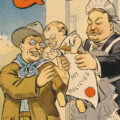Rejection is Seductive: Elisa Gabbert’s L’Heure Bleue

Elisa Gabbert’s unique gift is the ability to resurrect the cliché, which she does by reformulating common sense as a question and then attaching the well-worn sentiment to the unworn phrase, or bringing out the uncertainty inherent in the things we know for sure. Her poems are pleasantly uncanny, and the best lines can be read with ease but reread without end. This accessible complexity is a product of her preoccupation with a rather abstract but intensely intimate theme: the mind. The poems of her first book, The French Exit, comprise well-crafted streams of consciousness that flow from everyday observations and typically wind up seeming ludicrous. In her next book, The Self Unstable, she shifts her inquiry from the objects of consciousness to consciousness itself: “What was the self?” the opening poem asks.
Having explored how the mind works and what the mind is, in her latest book—L’Heure Bleue or The Judy Poems—Gabbert creates (or performs) a mind drawn out of a fictional construct: Judy, one of three characters from Wallace Shawn’s play The Designated Mourner.
Set in an indistinct location at an uncertain time in which an authoritarian government steadily cracks down on artists and intellectuals, The Designated Mourner features Judy and Judy’s father, Howard, an intellectual, as well as her husband, Jack, one of Howard’s acolytes. Much of the tension between these three stems from Jack’s repressed preference for lowbrow culture, even as he moves in Howard’s highbrow circles. This tension splinters Jack’s relationship with Judy and Howard and also saves his life; father and daughter are both executed.
In his helpful introduction to L’Heure Bleue, Aaron Angello recounts how he, Gabbert, and her partner, the novelist John Cotter, spent a year reading and rehearsing the play together before performing it in a variety of venues. After all that time inhabiting Judy’s mind, Gabbert felt that the character had not been as developed as Jack or Howard. “She had been imagining Judy’s feelings toward her father and toward her husband with a level of complexity that the play does not,” Angello explains. The poems, he continues, are Gabbert’s way of “thinking through Judy in the form of poetry.”
Readers don’t need to know The Designated Mourner to enjoy L’Heure Bleue. Gabbert’s new poems stand on their own as experiments in consciousness and character. They are written in the voice of Judy, Shawn’s character, and in the voice of Judy as she has been imagined and played by Gabbert. A reader is invited into Judy’s perspective, though the voice often sounds like the Elisa Gabbert of The French Exit and The Self Unstable:
I’m not in love with Jack.
I have a crush on Jack.
Jack is my husband, who left me.
“Absence makes the heart grow fonder”
is a silly way of putting the truth,
that rejection is seductive.
The title serves as the opening line (more on this later), but it is also the first in a triptych of lines that invites us into the mind of a woman whose world seems defined by her relationships with her father and husband. Gabbert reconfigures these relationships by relocating their center of gravity from Jack—“I’m not in love with Jack. / I have a crush on Jack.”—to Judy: “Jack is my husband, who left me.” In the first two lines, Judy orbits around Jack; in the third line he orbits around her. The closing stanza is vintage Gabbert, resuscitating a cliché by revealing its duplicity: “Absence makes the heart grow fonder” is an absurd way of observing that pain can be quite alluring.
Although a sense of plot lurks in the background of the poems much as it does in Shawn’s play, the formulation and energy of Judy’s psyche drives the book. The titles operate as stage directions. They set the scene, name a place, or explain a character’s state of mind:
“At the poetry reading,”
“Some days I can’t escape the feeling”
“A walk helps a little, a pause”
“We go to see the glass flowers”
“I’m not interested in art today.”
The title/poem relation embodies a kind of unity in disunity that Gabbert has explored throughout her work. There seems to be some division within the self that she sees as a fundamental feature of human experience. She meditates on this duality as a cause-effect relation in two brilliant lines from The Self Unstable:
You wanted a life of causes, but it was all effects: you could
never get before.
This nagging sense that there is something “before,” something behind, apart from, in addition to what we are most immediately conscious of. There’s me and then there’s what I know, say, and do. What accounts for this distinction? How can I be one person and yet seem to contain this instability? Rather than backing up or zooming out and trying to train her critical gaze on the way thinking works, in The Judy Poems Gabbert inhabits Judy’s mind itself. The titles announce an inciting event or theme that the poems carry through to their conclusion:
When we argue about war,
I say I’m a pacifist
and he looks for a loophole.He brings up Hitler, genocide—
these noble causes.The problem I have
is distinguishing between atrocities:
the genocide on one handand on the other
atomic bombs (their eyeballs melted),
torture, women and childrenraped and murdered
for the greater good.
It’s like the difference betweena billion and a trillion—
I believe they are different
but can’t conceive of it.The moral imperative
justifies the amoral,
the technically lesser atrocity.I think citizens don’t have to think
like countries.
Jack’s objections to Judy’s pacifism suggest he has weighed the contradiction at the heart of this problem and drawn a conclusion. But notice that his intention (in her mind) is not to persuade her but to find a weakness in her position, a “loophole.” He is not merely opposed to her pacifism but to her resistance to distinguishing between atrocities as somehow fundamentally different. Jack seems to know they are different, while Judy tells us that she “believes” they are in an especially incisive stanza about the difference between “a billion and a trillion— / I believe they are different / but can’t conceive of it.” Rather than end the poem there and characterize Jack as certain and Judy as indecisive, if thoughtful, Gabbert gives her both a moral calculus that is a more measured version of Jack’s argument and a strong opinion about the independence of her own conscience:
The moral imperative
justifies the amoral,
the technically lesser atrocity.I think citizens don’t have to think
like countries.
She articulates the logic of Jack’s position with precision and clarity in the penultimate stanza but demurs to demonstrate her own thoughts, in agreement or otherwise, regardless of how institutions and authorities exercise their power. She is both part of the citizenry and an individual citizen. Hers is a psychologically complex imagination that does not always have to be voiced in complete, clean soundbites: “…My thoughts / don’t coalesce into thoughts,” And yet, the irony of this line is that it uses a sophisticated cohesion to communicate a sense of fragmentation.
There are many moments like this scattered throughout the collection. The “difference between / a billion and a trillion” line is a keen example. Even in this slightly more somber book, she is unfailingly witty, even funny: “Nostalgia is the only cure / for nostalgia—” for instance, or “I like Dickinson’s face / but not her poetry.”
For some, the title of Gabbert’s latest book might be a turnoff. L’Heure Bleue or The Judy Poems is, after all, not quite as catchy as The French Exit or The Self Unstable. Or perhaps, like a concept album, the exploration of Judy’s character might seem to aim this book at a niche audience. But, like all of Gabbert’s work, L’Heure Bleue sparkles in sound and sense the first time through. She explains in her notes at the end that L’heure bleue is French for “the blue hour” and that it is also “the name of a perfume created in 1912 by Jacques Guerlain.” In her own writing on perfume, Gabbert has said that “some perfumes take only moments to love, but years to understand.” L’Heure Bleue or The Judy Poems is like these aromatic yet complicated scents, enjoyable on the first encounter and more sophisticated with each rereading.
About Matt Mullins
Matthew Mullins is assistant professor of English and History of Ideas at Southeastern Baptist Theological Seminary. He has published literary criticism in a variety of academic journals, and he tweets at @MullinsMattR.




